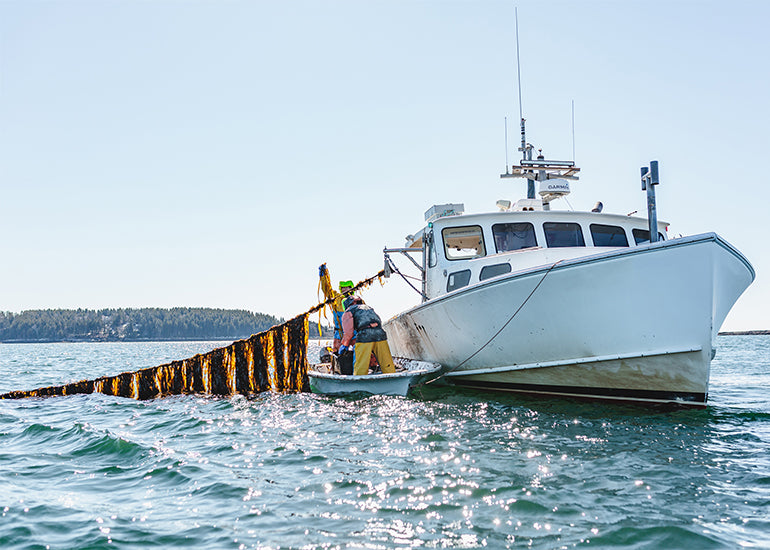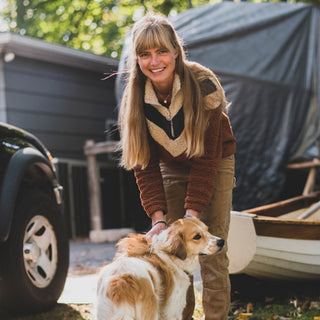When it comes to what we eat, we believe that where a food comes from is just as important as what it actually is. Forget calorie counts or macros; we want to know that our foods are grown in a way that supports the environment and increases the nutritional value within each bite!
That’s a tall order for most conventional crops, which are typically grown on vast swaths of monocropped farmland in soils long depleted of their minerals. Happily, it’s not too big of an ask for oceanic superstar kelp, found in our new Superfood+ Sea Veggie Blend. Unlike most forms of conventional agriculture, kelp aquaculture gives back to the environment in a variety of ways, leaving its ecosystem in better shape than before.
The three varieties of kelp found in our Sea Veggie Blend are grown in the North Atlantic, where they thrive in the cool, clean waters. Two of the kelps come from the coast of Maine, where Atlantic Sea Farms has been working with local fishing communities since 2009 to grow sustainable, organic, and regenerative kelp for the domestic food market. Unlike many other edible kelp products in the marketplace, 98% of which are imported, their kelp never contains artificial food dyes or industrial contamination from unregulated waters, and does not deplete the wild kelp beds necessary for a healthy ocean.
Want to learn more about why can feel good about making kelp a part of your diet? Here are our top four reasons to love responsibly farmed sea vegetables:
Fights ocean acidification—As it grows, kelp absorbs carbon dioxide and nitrogen from the ocean, releasing oxygen in exchange. This rebalancing act helps to combat ocean acidification, which is caused by excess levels of these gases in the environment. And ocean acidification is a real problem: when the ocean’s pH drops, shellfish can’t build healthy shells for themselves and begin to die off. As a result, species that rely on them as a food source—like whales, some fish, and many sea birds—struggle to feed themselves. By improving ocean acidification in its environment, kelp supports clean water and a healthy, balanced ecosystem.
Provides a habitat for marine life—The long, lush ribbons of kelp grow rapidly and densely, creating wavy, green-brown forests just below the water’s surface. These forests provide a habitat for many forms of sea life, from small fish that can hide themselves and their young within the strands, to small grazers that snack on the kelp for sustenance. This in turn brings in natural predators, supporting a healthy food chain that is essential for biodiversity and balance in the sea.
Low impact—Most farmed kelp is grown on long lines that are seeded and suspended between buoys to hang a few meters below the water’s surface. There, kelp gets everything it needs to grow from seawater and sunshine, turning these two ingredients into mineral- and fiber-rich kelp strands that can be consumed as food, or turned into resources like organic fertilizer, biofuels, and even animal feed! Unlike nearly every other commercially farmed crop, kelp requires no fertilizer, pesticides, freshwater resources, or arable land.
Supports coastal communities—In the North Atlantic, where our kelp is grown, climate change has made wild fisheries less predictable, which negatively impacts the livelihoods of fishing families. This means less income for many coastal communities that rely on fishing as a primary revenue stream. Happily, our partners at Atlantic Sea Farms have introduced opportunities for fishermen to diversify their incomes and farm kelp, which you can enjoy as part of our Superfood+ Sea Veggie Blend. Seaweed farming not only provides an additional and sustainable source of income, but it also falls during the off season for many fishermen, from late fall through early spring.
)

